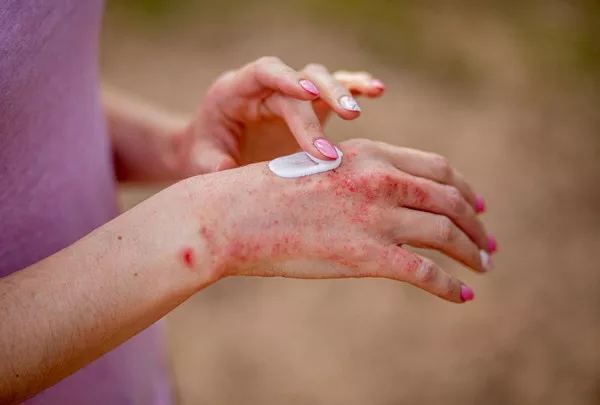In a significant advancement in eczema treatment, a novel topical pan-Janus kinase (JAK) inhibitor has demonstrated notable efficacy in alleviating symptoms of moderate to severe chronic hand eczema, according to results from two randomized Phase III clinical trials.
The trials, DELTA 1 and DELTA 2, revealed that patients treated with delgocitinib cream experienced substantial improvements in their condition compared to those using a placebo cream. At week 16, 20% of patients in the DELTA 1 trial and 29% in the DELTA 2 trial achieved treatment success based on the Investigator’s Global Assessment for Chronic Hand Eczema (IGA-CHE), compared to 10% and 7% in the control groups, respectively. Both trials reported statistically significant results (P≤0.0055).
Dr. Robert Bissonnette of Innovaderm Research in Montreal, who led the research, emphasized that these findings underscore the effectiveness and tolerability of delgocitinib cream. “The data supports delgocitinib as a viable treatment for adults with moderate to severe chronic hand eczema, offering a new option for managing this challenging condition,” Bissonnette noted in The Lancet.
Delgocitinib works by inhibiting JAK-dependent cytokine signaling, which reduces the inflammatory responses associated with chronic hand eczema. Bissonnette and his team highlighted that the trials confirm the critical role of JAK signaling pathways in the disease and suggest that targeting all JAKs may be necessary for optimal treatment.
In an accompanying editorial, Dr. Yael Renert-Yuval of Schneider Children’s Medical Center of Israel and Dr. Emma Guttman-Yassky of the Icahn School of Medicine at Mount Sinai, New York, acknowledged the trials as the first Phase III studies to evaluate a topical pan-JAK inhibitor for this condition. They noted that chronic hand eczema presents significant management challenges, partly due to difficulties in avoiding irritants and allergens.
The editorial also pointed out that topical JAK inhibitors, with their favorable safety profile, offer a potential long-term treatment alternative without the common side effects associated with corticosteroids. They emphasized the need for further studies to confirm the long-term safety and sustained efficacy of delgocitinib.
Both DELTA 1 and DELTA 2 were double-blind, parallel-group studies involving adults with moderate to severe chronic hand eczema. Participants received delgocitinib cream (20 mg/g) or a placebo twice daily for 16 weeks. DELTA 1 included 487 patients across research centers in Canada, France, Germany, Italy, Poland, and the U.K., while DELTA 2 involved 473 patients in Belgium, Canada, Denmark, Germany, the Netherlands, Poland, and Spain.
The primary endpoint was IGA-CHE treatment success at week 16, defined as a score of 0 (clear) or 1 (almost clear) with at least a two-step improvement from baseline. Secondary endpoints included improvements in the Hand Eczema Severity Index (HESCI) and reductions in pain and itching as reported in the Hand Eczema Symptom Diary (HESD). Results showed significant improvement in both HESCI scores and symptom relief for patients treated with delgocitinib.
Approximately 30% of patients in DELTA 1 and 31% in DELTA 2 achieved a 90% improvement in HESCI scores with delgocitinib, compared to 12% and 9% in the control groups (P<0.0001). Pain reduction, as measured by the HESD, was also significantly greater in the delgocitinib groups.
Adverse events were similar between the delgocitinib and control groups, with COVID-19 and nasopharyngitis being the most common. No severe adverse events related to JAK inhibitors were reported. Ongoing research includes an open-label extension trial (DELTA 3) to assess the long-term safety of delgocitinib.
Bissonnette and colleagues acknowledged that their study’s limitations include the predominantly white participant population and the relatively short treatment duration of 16 weeks.
Related Topics:

























